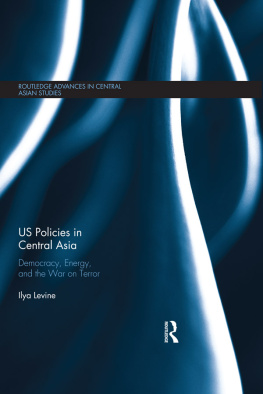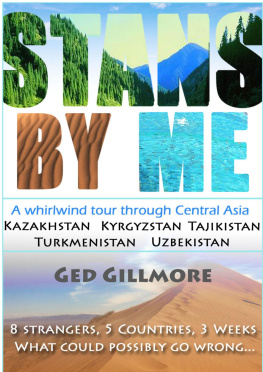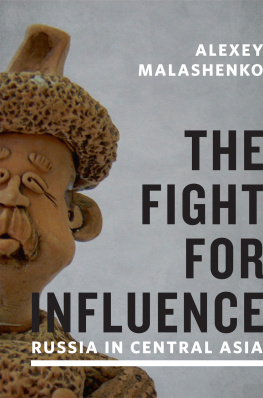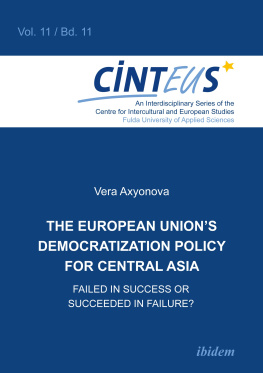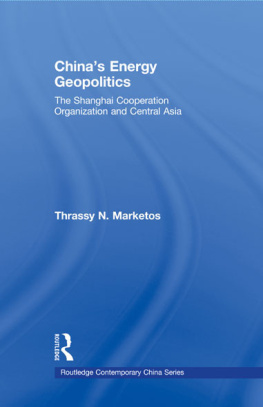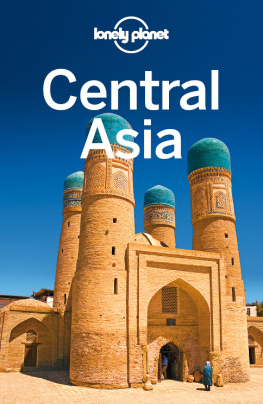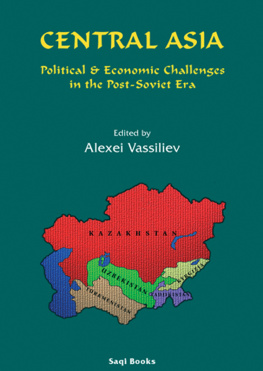US Policies in Central Asia
Democracy promotion, security and energy are the predominant themes of US policy in Central Asia after the Cold War. This book analyses how the Bush administration understood and pursued its interests in the Central Asian states, namely Kyrgyzstan, Tajikistan, Kazakhstan, Uzbekistan, and Turkmenistan. It discusses the shift in US interests after September 11 and highlights key ideas, actors, and processes that have been driving US policy in Central Asia. The author examines the similarities between the Bush and Obama administrations attitudes towards the region, and he points to the inadequacy of the personality focused, partisan accounts that have all too often been deployed to describe the two presidential administrations. To understand US Central Asian policy, it is necessary to appreciate the factors behind its continuities as well as the legacies of the September 11 attacks.
Using case studies on the war on terror, energy, and democracy, drawing on personal interviews with Americans and Central Asians as well as the fairly recent releases of declassified and leaked US government documents via sources like the Rumsfeld Papers and Wikileaks, the author argues that the US approached Central Asia as a non- unitary state with an ambiguous hierarchy of interests. Traditionally domestic issues could be internationalised and non-state actors were able to play significant roles. The actual relationships between its interests were neither as harmonious nor as conflicted as the administration and some of its critics claimed.
Shedding new light on US relations with Central Asia, this book is of interest to scholars of Central Asia, US Politics, and International Relations.
Ilya Levine received his Ph.D. in International Relations from the University of Melbourne, Australia. His research interests include US foreign policy, Russian politics, and Central Asia.
Routledge advances in Central Asian studies
1 Oil, Transition and Security in Central Asia
Edited by Sally N. Cummings
2 The European Union and Central Asia
Edited by Alexander Warkotsch
3 Politics, Identity and Education in Central Asia
Edited by Pinar Akcali and Cennet Engin-Demir
4 Regime Transition in Central Asia
Stateness, Nationalism and Political Change in Tajikistan and Uzbekistan
Dagikhudo Dagiev
5 Power, Networks and Violent Conflict in Central Asia
A Comparison of Tajikistan and Uzbekistan
Idil Tuner-Klavuz
6 From Conflict to Autonomy in the Caucasus
The Soviet Union and the Making of Abkhazia, South Ossetia and Nagorno Karabakh
Arsne Saparov
7 Identity and Politics in Central Asia and the Caucasus
Edited by Murad Ismayilov and Mohammed Ayoob
8 TurkishAzerbaijani Relations
One NationTwo States?
Edited by Murad Ismayilov and Norman A. Graham
9 US Policies in Central Asia
Democracy, Energy, and the War on Terror
Ilya Levine
First published 2016
by Routledge
2 Park Square, Milton Park, Abingdon, Oxon OX14 4RN
and by Routledge
711 Third Avenue, New York, NY 10017
Routledge is an imprint of the Taylor & Francis Group, an informa business
2016 Ilya Levine
The right of Ilya Levine to be identified as author of this work has been asserted by him in accordance with sections 77 and 78 of the Copyright, Designs and Patents Act 1988.
All rights reserved. No part of this book may be reprinted or reproduced or utilised in any form or by any electronic, mechanical, or other means, now known or hereafter invented, including photocopying and recording, or in any information storage or retrieval system, without permission in writing from the publishers.
Trademark notice: Product or corporate names may be trademarks or registered trademarks, and are used only for identification and explanation without intent to infringe.
British Library Cataloguing in Publication Data
A catalogue record for this book is available from the British Library
Library of Congress Cataloging-in-Publication Data
Names: Levine, Ilya, author.
Title: US policies in Central Asia : democracy, energy and the war on
terror / Ilya Levine.
Other titles: U.S. policies in Central Asia | United States policies in
Central Asia
Description: Abingdon, Oxon ; New York, NY : Routledge, 2016. |
Series: Routledge advances in Central Asian studies ; 9 | Includes
bibliographical references and index.
Identifiers: LCCN 2015048687 | ISBN 9781138642041 (hardback) |
ISBN 9781315630144 (ebook)
Subjects: LCSH: Asia, CentralForeign relationsUnited States. | United
StatesForeign relationsAsia, Central. | Asia, CentralStrategic aspects. |
Asia, CentralPolitics and government1991
Classification: LCC DK857.75.U6 L48 2016 | DDC 327.73058dc23
LC record available at http://lccn.loc.gov/2015048687
ISBN: 978-1-138-64204-1 (hbk)
ISBN: 978-1-315-63014-4 (ebk)
Typeset in Times New Roman
by Wearset Ltd, Boldon, Tyne and Wear
US Policies in Central Asia was commissioned by Dorothea Schaefter. I am grateful to her, Jillian Morrison, and the rest of the Routledge team. This project received invaluable assistance from several other sources as well. Much of it draws on my Ph.D. research at the University of Melbourne between 2009 and 2013. This research was supported by the Australian Commonwealth through an Australian Postgraduate Award. I also received support for my field research in the US and Central Asia from the Melbourne University Travel for Research in Postgraduate Study (TRIPS) scheme and an Asia Institute Ph.D. research grant. The success of the research trip was to a great extent a result of the generosity, patience, and insights of my interviewees. I am also grateful to Sasha, Aidana, Ira, Marianna, and Ulan for their warmth and hospitality in the US and Kyrgyzstan. My thesis supervisors, Shahram Akbarzadeh and Pradeep Taneja, provided me with excellent advice and support throughout my work. Ralph Pettmans extensive feedback was very useful during the latter stages of this project. I also received helpful early advice from Robert Deuchars and, later, from Dylan Taylor. The United Nations Publications Board kindly agreed to let me reproduce their maps of Central Asia. Last but not least, I am grateful for the support I received from Marina and Igor Levine. Any shortcomings in this study are the sole responsibility of its author and should not reflect poorly on any of the individuals mentioned above.

